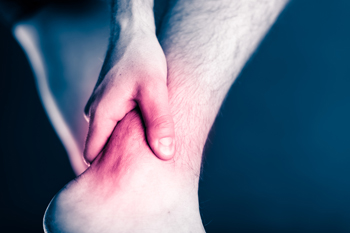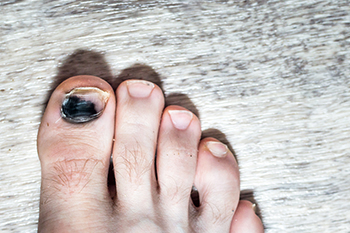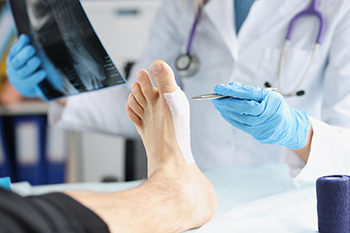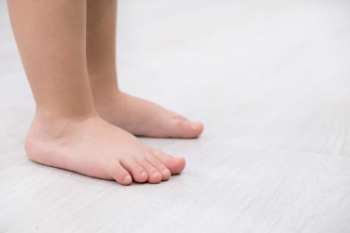Items filtered by date: June 2024
Treatment Options for an Achilles Tendon Tear

An Achilles tendon tear, whether partial or complete, is a serious injury often caused by sudden, forceful movements during sports or activities. Symptoms of an Achilles tendon tear include sharp pain, swelling, bruising, and difficulty pointing the foot or standing on tiptoe. Treatment options vary depending on the severity of the tear. Partial tears can often be managed conservatively with immobilization using a cast, splint, brace, or walking boot. This is followed by a structured rehabilitation program to restore strength and flexibility gradually. Complete tears typically require surgical intervention to reattach the tendon ends and ensure optimal healing. Following surgery, a thorough rehabilitation plan is essential to regain full function and reduce the risk of re-injury. If you suspect an Achilles tendon tear or experience symptoms like sudden pain and restricted movement, it is suggested that you seek an appointment with a podiatrist for a full exam and tailored treatment plan.
Achilles tendon injuries need immediate attention to avoid future complications. If you have any concerns, contact Deborah Rosenfeld of Rosenfeld Podiatry. Our doctor can provide the care you need to keep you pain-free and on your feet.
What Is the Achilles Tendon?
The Achilles tendon is a tendon that connects the lower leg muscles and calf to the heel of the foot. It is the strongest tendon in the human body and is essential for making movement possible. Because this tendon is such an integral part of the body, any injuries to it can create immense difficulties and should immediately be presented to a doctor.
What Are the Symptoms of an Achilles Tendon Injury?
There are various types of injuries that can affect the Achilles tendon. The two most common injuries are Achilles tendinitis and ruptures of the tendon.
Achilles Tendinitis Symptoms
- Inflammation
- Dull to severe pain
- Increased blood flow to the tendon
- Thickening of the tendon
Rupture Symptoms
- Extreme pain and swelling in the foot
- Total immobility
Treatment and Prevention
Achilles tendon injuries are diagnosed by a thorough physical evaluation, which can include an MRI. Treatment involves rest, physical therapy, and in some cases, surgery. However, various preventative measures can be taken to avoid these injuries, such as:
- Thorough stretching of the tendon before and after exercise
- Strengthening exercises like calf raises, squats, leg curls, leg extensions, leg raises, lunges, and leg presses
If you have any questions please feel free to contact our office located in Marlton, NJ . We offer the newest diagnostic tools and technology to treat your foot and ankle needs.
Causes and Symptoms of Bruised Toenails

Bruised toenails, also known as subungual hematomas, typically result from trauma or injury to the toe. The sensitive nail bed can easily sustain damage from sudden impact or repetitive pressure, leading to discoloration and discomfort. Trauma, such as stubbing the toe or dropping a heavy object on it, can cause blood vessels beneath the nail to rupture. This leads to the accumulation of blood and the characteristic dark discoloration, usually dark blue or black. If left untreated, bruised toenails can lead to a spread of discoloration or even nail detachment, along with an increased risk of infection. Proper footwear, especially for runners, and caution in high-risk activities are key factors in reducing the likelihood of trauma to the toenails. Recognizing the symptoms of bruised toenails enables individuals to seek timely treatment, prevent potential complications and promote faster recovery. If you've experienced a problematic bruised toenail, it is suggested that you make an appointment with a podiatrist for treatment.
Toe pain can disrupt your daily activities. If you have any concerns, contact Deborah Rosenfeld of Rosenfeld Podiatry. Our doctor can provide the care you need to keep you pain-free and on your feet.
What Causes Toe Pain?
Most severe toe pain is caused due to a sports injury, trauma from dropping something heavy on the toe, or bumping into something rigid. Other problems can develop over time for various reasons.
Toe pain can be caused by one or more ailments. The most common include:
- Trauma
- Sports injury
- Wearing shoes that are too tight
- Arthritis
- Gout
- Corns and calluses
- Hammertoe
- Bunions
- Blisters
- Ingrown toenails
- Sprains
- Fractures (broken bones)
- Dislocations
When to See a Podiatrist
- Severe pain
- Persistent pain that lasts more than a week
- Signs of infection
- Continued swelling
- Pain that prevents walking
Diagnosis
In many cases the cause of toe pain is obvious, but in others, a podiatrist may want to use more advanced methods to determine the problem. These can range from simple visual inspections and sensation tests to X-rays and MRI scans. Prior medical history, family medical history, and any recent physical traumatic events will all be taken into consideration for a proper diagnosis.
Treatment
Treatments for toe pain and injuries vary and may include shoe inserts, padding, taping, medicines, injections, and in some cases, surgery. If you believe that you have broken a toe, please see a podiatrist as soon as possible.
If you have any questions please feel free to contact our office located in Marlton, NJ . We offer the newest diagnostic tools and technology to treat your foot and ankle needs.
Minor Foot Surgery
 Minor foot surgery encompasses a range of procedures aimed at addressing common foot problems with minimal invasiveness. These surgeries are often performed to correct issues like ingrown toenails, bunions, hammertoes, and plantar warts. Ingrown toenail surgery involves removing part or all of the affected nails to relieve pain and prevent infection. Bunion surgery, or a bunionectomy, involves realigning the bone, ligaments, and tendons to correct the deformity. Hammertoe surgery aims to straighten the bent toe by removing a portion of the bone or releasing the tendon. Plantar wart removal can be performed using various methods, including excision, laser therapy, or cryotherapy. These procedures are typically done on an outpatient basis under local anesthesia, allowing for quick recovery and minimal downtime. If you have any sort of foot problem, it is suggested that you schedule an appointment with a podiatrist. After a thorough examination and imaging tests, the best treatment, which may include minor surgery, will be discussed.
Minor foot surgery encompasses a range of procedures aimed at addressing common foot problems with minimal invasiveness. These surgeries are often performed to correct issues like ingrown toenails, bunions, hammertoes, and plantar warts. Ingrown toenail surgery involves removing part or all of the affected nails to relieve pain and prevent infection. Bunion surgery, or a bunionectomy, involves realigning the bone, ligaments, and tendons to correct the deformity. Hammertoe surgery aims to straighten the bent toe by removing a portion of the bone or releasing the tendon. Plantar wart removal can be performed using various methods, including excision, laser therapy, or cryotherapy. These procedures are typically done on an outpatient basis under local anesthesia, allowing for quick recovery and minimal downtime. If you have any sort of foot problem, it is suggested that you schedule an appointment with a podiatrist. After a thorough examination and imaging tests, the best treatment, which may include minor surgery, will be discussed.
Foot surgery is sometimes necessary to treat a foot ailment. To learn more, contact Deborah Rosenfeld of Rosenfeld Podiatry. Our doctor will assist you with all of your foot and ankle needs.
When Is Surgery Necessary?
Foot and ankle surgery is generally reserved for cases in which less invasive, conservative procedures have failed to alleviate the problem. Some of the cases in which surgery may be necessary include:
- Removing foot deformities like bunions and bone spurs
- Severe arthritis that has caused bone issues
- Cosmetic reconstruction
What Types of Surgery Are There?
The type of surgery you receive will depend on the nature of the problem you have. Some of the possible surgeries include:
- Bunionectomy for painful bunions
- Surgical fusion for realignment of bones
- Neuropathy decompression surgery to treat nerve damage
Benefits of Surgery
Although surgery is usually a last resort, it can provide more complete pain relief compared to non-surgical methods and may allow you to finally resume full activity.
Surgical techniques have also become increasingly sophisticated. Techniques like endoscopic surgery allow for smaller incisions and faster recovery times.
If you have any questions please feel free to contact our office located in Marlton, NJ . We offer the newest diagnostic and treatment technologies for all your foot and ankle needs.
Causes and Managing of Flat Feet in Children

Flat feet, medically termed pes planus, is a common condition among children, indicated by a lack of arch in the foot. While many children naturally outgrow flat feet as they develop, some may experience persistent symptoms that warrant attention. The causes of flat feet in children vary, including genetics, lax ligaments, muscle weakness, or developmental abnormalities. Additionally, factors like obesity, improper footwear, or excessive standing can worsen the condition. Identifying flat feet in children involves observing certain signs, such as foot pain, fatigue, or an uneven gait. Although flat feet often do not cause significant issues, severe cases may lead to discomfort and difficulty walking. They may even contribute to other lower limb problems later in life. Management strategies typically focus on alleviating symptoms through supportive footwear, orthotic inserts, or stretching exercises. If your child does not gradually develop arches in their feet, it is suggested that a podiatrist be consulted who can conduct an exam and monitor flat feet.
Making sure that your children maintain good foot health is very important as they grow. If you have any questions, contact Deborah Rosenfeld of Rosenfeld Podiatry. Our doctor can provide the care you need to keep you pain-free and on your feet.
Keeping Children's Feet Healthy
Having healthy feet during childhood can help prevent medical problems later in life, namely in the back and legs. As children grow, their feet require different types of care. Here are some things to consider...
Although babies do not walk yet, it is still very important to take care of their feet.
Avoid putting tight shoes or socks on his or her feet.
Allow the baby to stretch and kick his or her feet to feel comfortable.
As a toddler, kids are now on the move and begin to develop differently. At this age, toddlers are getting a feel for walking, so don’t be alarmed if your toddler is unsteady or ‘walks funny’.
As your child gets older, it is important to teach them how to take care of their feet.
Show them proper hygiene to prevent infections such as fungus.
Be watchful for any pain or injury.
Have all injuries checked by a doctor as soon as possible.
Comfortable, protective shoes should always be worn, especially at play.
If you have any questions please feel free to contact our office located in Marlton, NJ . We offer the newest diagnostic and treatment technologies for all your foot and ankle needs.


